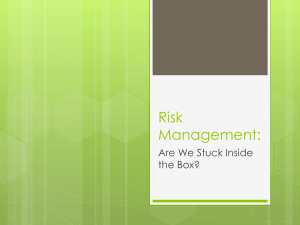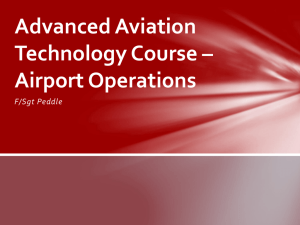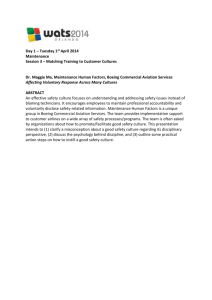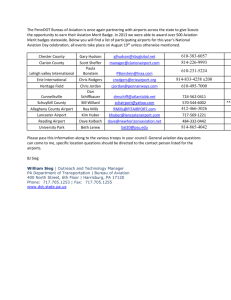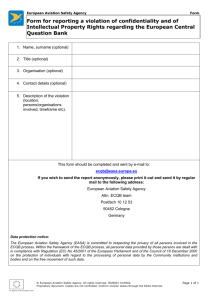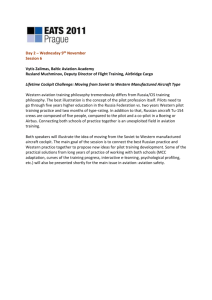MEAUSE Annual Workshop Forum 2015 Post
advertisement
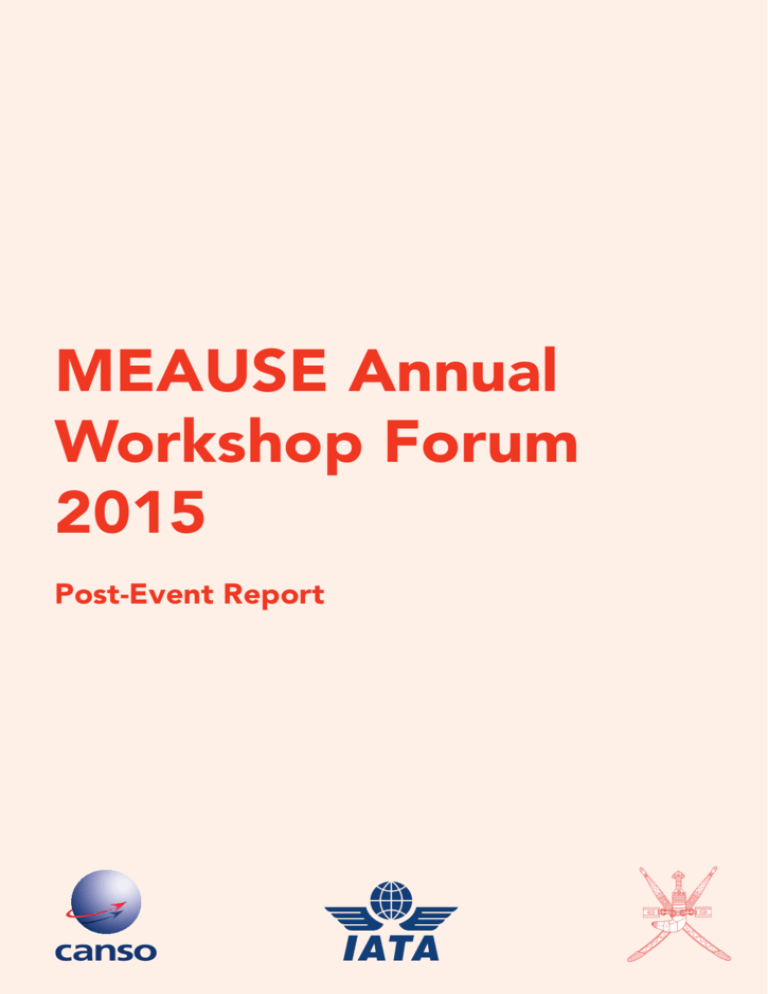
MEAUSE Annual Workshop Forum 2015 Post-Event Report civil air navigation services organisation 2 1 2 3 4 5 6 7 MEAUSE Workshop Forum: Background and Overview________________________________________________ page 3 Day One – Plenary _____________________________________________________________________________________ page 4 Day Two – Overview ____________________________________________________________________________________ page 10 CANSO – IATA Customer Relationship Management Workshop _____________________________________________ page 11 CANSO Safety Workshop ________________________________________________________________________________ page 13 Plenary Wrap – Up Session ______________________________________________________________________________ page 14 Summary of the MEAUSE SG Meeting ___________________________________________________________________ page 15 First MEAUSE Annual Workshop Forum, 17 – 18 February 2015, Muscat, Oman 3 1 MEAUSE Workshop Forum: Background and Overview MEAUSE, the ‘Middle East ANSP, Airspace Users and Stakeholder Engagement’ initiative was created in 2010. To date it is the only formal platform in the Middle East which offers all stakeholders (States, civil and military airspace users, ANSPs, airports, suppliers, academies) and the public the opportunity to address and discuss joint solutions for all those topics that require a multi-stakeholder approach. The first (2015) MEAUSE Annual Workshop Forum focused on: performance frameworks and benchmarking from an airline and ANSP perspective; customer relationship management (consultation and cultural change); and safety. As the programme had been tailored to meet the demand of the region, it attracted 90, extremely engaged, participants from 29 organisations. In the presence of Dr. Mohammed Nasser Al Zaabi, the CEO of PACA, Mark DeNicuolo, CANSO Safety Programme Manager presented the CANSO Annual Safety Award to the Middle East Safety Workgroup for its work in conducting regional safety surveys; holding safety culture seminars; and developing a three-year strategic action plan to address key regional safety issues. This award is presented annually by the CANSO Safety Standing Committee to a person or group in recognition of outstanding safety achievement. The award was accepted by Mr. Khaled Arabiyat, the Chair of the Middle East Safety Workgroup. All participants welcomed the new MEAUSE event format and strongly supported the proposed main conclusion to: —— Combine efforts to get all other stakeholder associations and organisations to join MEAUSE —— Maintain the regional all-stakeholder direction, but also consider offering national CRM-workshops inviting all stakeholders (see CARC example) —— Send a survey before the next regional Annual Workshop Forum asking stakeholders to suggest topics for the discussion of regional multi-stakeholder solutions Gudrun Held, DFS, and Achim Baumann, IATA, the MEAUSE Chair-Team would like to thank Dr. Mohammed Nasser Al Zaabi, CEO of PACA, and all the PACA colleagues for hosting the event in Muscat, Oman. We were delighted to welcome DANS and Global ATS as new MEAUSE members. First MEAUSE Annual Workshop Forum, 17 – 18 February 2015, Muscat, Oman 4 2 Day One – Plenary 1. Welcome and Opening After the opening words of Hamad Alaufi, CANSO Director Middle East, the MEAUSE Chair-Team (Gudrun Held, DFS and Achim Baumann, IATA) gave a brief overview of MEAUSE, emphasising that CANSO and IATA had signed the MEAUSE Partnership Agreement as both organisations recognised the value of and the need for an institutionalised platform for regional stakeholder engagement. Therefore, they will approach all stakeholder associations in the Middle East inviting them to also sign the MEAUSE Partnership Agreement. They will ask ICAO to continue and intensify its interaction with MEAUSE and they will continue to encourage all individual stakeholders in the Middle East to actively participate in MEAUSE activities. Before presenting the main achievements in 2014, they thanked HE Dr. Mohammed Nasser Al Zaabi, CEO of PACA and H.E. Anwar Abdullah Moosa Al Raisi for their support and for hosting the first MEAUSE Annual Workshop. Main achievements in 2014 were: —— signing of CANSO – IATA MEAUSE Partnership Agreement —— streamlining of MEAUSE support and activities —— publication of MEAUSE guidance material (available on CANSO website) —— alignment with ongoing activities in Middle East to avoid duplication of efforts and delivery of added-value to all stakeholders First MEAUSE Annual Workshop Forum, 17 – 18 February 2015, Muscat, Oman 5 2. Performance- driven ANSP Management This session aimed to give a brief insight into the concept of performance-driven management and its importance and application within the aviation industry in the Middle East region. Performance-driven management is a systematic approach to performance improvement through an ongoing process of establishing strategic performance objectives; measuring performance; collecting, analysing, reviewing, and reporting performance data; and using that data to drive improvement. High performance across stakeholders in the aviation value chain is crucial to enable the predicted growth in passenger traffic in the Middle East region. Airlines and airports respond directly to the demands of their aviation customers (i.e. passengers). ANSPs in turn should take into account the requirements of their customers (i.e. airlines and airports) when considering what it means to be high performing. Organisational culture is also a fundamental part of performance-based management. Strategy and performance targets should be communicated to all levels of the organisation and employees should be motivated to act according to these goals. CANSO Performance Framework and Fitness-Check - supporting ANSPs to better serve their customers. First MEAUSE Annual Workshop Forum, 17 – 18 February 2015, Muscat, Oman 6 High Performing ANSPs employ many tools that help them to better respond to the needs of their customers. To support ANSPs to transform to ‘high performers’, the CANSO Standing Committees and Workgroups have developed a range of guidance material and performance improvement tools. While the majority of the material is publicly available on the CANSO website, some is reserved for CANSO Members only. The CANSO Fitness Check is a basic self-assessment tool that consists of 19 questions with five capability levels covering Business Strategy, Airspace, Safety, People, Customer Focus, ATM Systems and Environment. ANSPs are asked to circle their present position (green) and where they want to be in three to five years. As resources are limited, completing the Fitness Check helps ANSPS to stay focused and identify clear priorities. CANSO conducts an annual Fitness Check survey to be current on the priorities of its members. MEAUSE will make use of the high-level results for the Middle East to help raise capabilities and support in those areas that require a multi-stakeholder approach. First MEAUSE Annual Workshop Forum, 17 – 18 February 2015, Muscat, Oman 7 Break-out session: Feedback of participants Each table was asked to define three main actions that are required for a move from level 2 to 4 and, if the group consisted of multi-stakeholders, identify the main differences between ANSPs, airlines and airports. General feedback included a comment by airlines that the fitness-check could be a good vehicle to help ANSPs and airlines (and possibly other stakeholders) to learn more about and better understand needs, priorities and ambitions to improve important areas of their services (e.g. safety). Presentations of proposed actions to move from level 2 to level 4: Safety Culture: —— Safety culture is the most important; it helps people to understand threats, risk assessment (technical, human) and mitigation, safety management system promotion, including customer relationship management, nonpunitive reporting – trust (top management – working level), —— Safety management development and embedding with staff —— Has to be part of training to start from induction —— Benchmarking against others —— Collect data (identify gaps) to measure Civil military relationship —— Exchange information —— Civil-military cooperation authority —— Correct time / date for military exercises —— Safety workhops and training Customer Focus —— Identify customers and their needs and requirements —— Establish processes to obtain performance data —— Surveys for feed-back —— Identify improvements and review progress Environment —— Educate the public about enironment and green flights Infrastructure and Technology —— Some interoperability —— CANSO could assist with cooperation in the region Learning and improvement —— Open channel of communication with stakeholders —— Forum needed for regular evaulation of services —— Goals and key performance indicators from top management Process and organisational structure —— Gap analysis to identify improvements —— Education of staff and managers —— Authority given from top management First MEAUSE Annual Workshop Forum, 17 – 18 February 2015, Muscat, Oman 8 2. Benefits of Consultation Hanan Qabartai shared the experience of CARC: From an ANSP point of view, and by defining the concept of consultation, CARC Jordan drew the participants’ attention to the importance of consultation with customers, who will eventually be their stakeholders. Major facts about consultation were shared in addition to sharing some of the different consultation projects conducted by CARC during 2014; valid advice about valid consultation areas where ANSP can conduct their consultation processes were made known as well. Time saving of projects implementation, customers’ adoption for projects and solutions, money saving, and agreement on strategic projects are some of the main benefits for consultation. Ms. Qabartai, CARC, underlined the importance of everybody starting conducting consultation with their customers and stakeholders, and should not wait until they have a mature CRM process. That could be accomplished by seeking the opinions and views of customers, whether through consultation with individuals, groups, or both. The development of a consultation mechanism which could be considered best practice, and which can be implemented and used effectively between ANSPs and their customers is considered to be the fundamental block for a healthy relationship with customers. Ms. Qabartai also highlighted the importance of maintaining a culture of consultation internally within the organisation all the time, because that will keep the process ongoing. Radi Radi, Royal Jordanian, talked about the airline’s positive experience when it comes to consultation with the local ANSP. The consultation facilitated by MEAUSE helped the airline and the local ANSP align their resources towards common objectives. While the stress remains on the ANSP side to deliver results that meet the customer requirement and enable a more efficient operation, the airline consultation allowed the scarce resources to be allocated to the more insistent needs of all the airspace users and customers. While collaboration ranged from optimised procedure design to testing on the airline’s aircraft and simulators, to a number of procedural bottlenecks, the added- value that was and will be achieved had a marked value throughout the aviation value chain and not limited to the one customer that was consulted. Royal Jordanian also benefited in gaining knowledge on priorities for its own equipage and training. Radi also talked about the belief that the level of equipage available in airlines will allow the burden of applying new procedures to rest with the airlines, provided that it is within their requirements and achieves added value to the customer. Achim Baumann, IATA presented an airline view on consultation not only on user charges and with this underpinning the MEAUSE approach of communication and engagement of all aviation stakeholders. The awareness of all stakeholders on “what” is or needs to be done, “how” it is done and “why” in this specific way is crucial and the main driver for consultation and collaboration . If everybody is aware of these questions, understanding the “how much” or how do I/we all benefit from the ‘what’ is easy. Such a holistic consultation process does not happen in a vacuum, it needs to take into account the environment in which the services are provided and allow for smart setting of key performance indicators (KPI). In the view of airlines these KPIs are related to safety, capacity, efficiency, service quality and cost of services. Having said this, the best and most beneficial service is delivered when customer requirements are clearly understood and the service is provided according to these requirements. Therefore, airlines and IATA are looking for an end-to-end involvement with changes (technical, operational or financial) which could influence operations. This involvement is aimed at working together with all involved stakeholders to achieve a mutually agreed and most beneficial solution. MEAUSE represents a vital element in this approach to consultation. First MEAUSE Annual Workshop Forum, 17 – 18 February 2015, Muscat, Oman 9 4. Brief Introduction to the Seminars on Day 2 Nicola Bakowski, NATS and Rose Al Osta, IATA presented a brief introduction to the CRM-workshop and its focus on customer segmentation, benefits of consultation and cultural change (how to become a truly and committed customer oriented organisation). They emphasised that, while building on the first CRM seminar and the CANSO-IATA Middle East Guide to Customer Relationship Management, the real value of the second workshop was the sharing of examples by regional stakeholders. They also stated that these examples will feature in the first update to the Middle East Guide to Customer Relationship Management, which will be ready for publishing by June 2015. First MEAUSE Annual Workshop Forum, 17 – 18 February 2015, Muscat, Oman 3 Day Two - Overview The one-day CRM and Safety Workshops were held in parallel followed by a plenary feed-back session. 10 First MEAUSE Annual Workshop Forum, 17 – 18 February 2015, Muscat, Oman 11 4 CANSO-IATA Customer Relationship Management Workshop The Customer Relationship Management (CRM) workshop built on the CRM activities undertaken by MEAUSE to date. The aim of the workshop was to provide participants an opportunity to: —— gain an appreciation of the benefits of customer relationship management —— gain an appreciation of the main CRM processes and tools (high level) —— hear and discuss real examples (that can be subsequently incorporated into an update to the Middle East Guide to Customer Relationship Management) —— propose next steps and how MEAUSE can support Specifically the second CRM workshop focussed on three areas —— Philosophy of CRM, Middle East Guide to Customer Relationship Management and CRM tools —— Benefits of consultation —— Cultural change: how to become a customer-oriented organisation Each of these focus areas included presentations of examples from the region followed by discussions to encourage sharing of experience and improvement. Welcome, Introduction and Setting the Scene Gudrun Held (DFS) and Rose Al Osta (IATA) welcomed the participants to the second CRM workshop and thanked PACA for hosting the event. Expectations for the workshop were collected from the 27 delegates, which included ANSPs, airlines, military and airports. An overview of MEAUSE CRM activities undertaken to date was provided by Nicola Bakowski (NATS) and the philosophy and principles of CRM were discussed, together with the evolution of the customer relationship and the basic CRM processes (see CANSO-IATA Middle East Guide to Customer Relationship Management). Customer Segmentation CARC Jordan shared its experiences of the customer segmentation activity undertaken as part of the CRM pilot project. Customers are different; they have different strategies, different objectives and therefore their needs are different. Therefore it is important to define the different customer groups for your organisation, analyse the different needs and ensure that that the CRM processes are tailored accordingly. Subsequent discussions highlighted how important it is for each individual organisation to understand its customers as these can differ between ANSPs. Consultation Emirates Airline (Peter Raw) presented two examples of great cooperation between airlines and ANSPs – the implementation of iFLEX routes in North Africa and the ICO FPL 2012 testing. Both activities required significant cooperation between multiple ANSPs, airlines and other organisations. IATA (Achim Baumann) summarised the ICAO requirements for consultation processes and charging principles and highlighted two areas of consultation where IATA is actively involved (relating to the Empty Quarter). First MEAUSE Annual Workshop Forum, 17 – 18 February 2015, Muscat, Oman 12 Sudan Air Navigation Services Department – SCAA - (Salah Elsaddig) presented an example of CRM being used to good effect to deliver the national safety programme project in Sudan. The project objectives included building and strengthening the relationship between SCAA and customers as well as aligning and harmonising future plans. Cultural Change DANS (Russell Akehurst) provided a brief history of DANS and the relationship it has and is continuing to enhance with its customers. Key to building trust and mutual understanding is open and honest communication – processes alone are not enough. DANS is now seeking input from its customers in order to inform its strategy for the future. Royal Jordanian Air Force (Col Azmi) presented the development of multi-profile training areas (areas can be used by civil and military users for different services and missions). The project necessitated cultural change through the identification of new ideas, combining resources in new ways and impacting the institutional framework. NATS (Nicola Bakowski) provided a brief overview of the CANSO CRM survey and Royal Jordanian (Radi Radi) shared the experience of how the survey was used with good results with CARC-Jordan to identify focus areas and actions to address. This has strengthened the relationship between CARC and RJ. Main Points from Discussions Throughout the workshop, there were a number of excellent discussions on the topics. The key messages from these were: —— The importance of engaging not only customers, but also other stakeholders, e.g. adjacent ANSPs. This is crucial for the region. The concept of holding “national MEAUSEs” to bring together stakeholders was discussed and should be further explored —— It is not enough to have processes and mechanisms - honest and authentic communication is fundamental to building trust —— Any stakeholder can initiate a consultation – frequently it is the stakeholder with the need to change that will initiate. This could be through e.g. individual approach to relevant stakeholders, approach through CANSO, IATA, ICAO —— Need to embed CRM so it becomes a “way of life” from top management through all levels of the organisation —— MEAUSE CRM team can provide some support to ANSPs in the region that wish to work on CRM e.g. facilitating workshops (internal/with customers) —— There was agreement that all of the workshops attendees ‘bought into’ CRM and its benefits; the challenge is how best to engage those who did not attend the workshop Speakers and delegates were thanked for their participation in the successful workshop. First MEAUSE Annual Workshop Forum, 17 – 18 February 2015, Muscat, Oman 13 5 CANSO Safety Workshop The Safety workshop was opened by Mr. Hamad Alaufi, CANSO Director Middle East Affairs, who extended a warm welcome to all participants of the Middle East Safety Workshop and wished them a pleasant and successful workshop. He also thanked PACA, Oman for its efforts to host and organise the event. The workshop was attended by 35 participants, from ANSPs, airlines, IATA, military, regulators, aerodrome operators and training academies. Great commitment and full and active participation were noticed. The first session was presented by Khaled Arabiyat, Chair, Middle East Safety Workgroup, who introduced the runway incursions, indicating that in many countries where traffic density is high, runway incursions have been on the increase for several years. ICAO took few actions in 2001 to address the problem, and in 2007 ICAO published Doc 9870 Manual on the prevention of Runway Incursions. Types of runway incursions and excursions were presented and the differences between runway incursions and excursions were explained in addition to the reasons that lead to such incursions. The importance of establishing runway incursions preventive programme by establishing Runway Safety Teams (RST) for each State and for each aerodrome was highlighted as well . The second session was presented by Mr. Mark Denicuolo, CANSO Safety Programme Manager, who presented the unstable approach, explaining the consequences associated with unstable approaches, the causes of an unstable approach, how we know if unstable approaches are occurring, how we mitigate them and how we know if the mitigations are effective. He also gave the participants an overview of the issue with the support of Mr. George Rhodes, Assistant Director, Infrastructure IATA MENA. The group identified unstable approach causal factors that will be finalised by the Safety Workgroup and distributed to participants to include in data collection processes. The last and third session was managed and presented by Mr. Gary Lloyd, Senior ATM Safety Consultant (Vice Chair, Middle East Safety Workgroup). He said that safety culture familiarisation provided determined safety culture metrics and targets for the region. These will be finalised by the Safety Workgroup and distributed to all participants. First MEAUSE Annual Workshop Forum, 17 – 18 February 2015, Muscat, Oman 6 Plenary Wrap-Up Session Safety Workshop: —— Runway Incursion: Khaled Arabyat provided familiarisation with definition, factors and Local Runway Safety Teams. —— Safety Culture: Familiarisation presented by Gary Lloyd. Determined Safety Culture metrics and targets for the region. Safety Work Group will finalise the list and distribute to participants. —— Unstable Approach: Mark DeNicuolo provided an overview with support from George Rhodes. The group identified unstable approach causal factors that will be finalised by the Safety Work Group and distribute to participants to include in data collection processes. 14 First MEAUSE Annual Workshop Forum, 17 – 18 February 2015, Muscat, Oman 15 7 Summary of the MEAUSE SG Meeting In its meeting on 18 February, the MEAUSE Steering Group discussed the Annual Workshop Forum and discussed the following recommendations and next steps: Recommendations The format, to focus on solutions and improvement, instead of the presentation of high-level presentations, proved to be successful. Future MEAUSE events should continue to clearly respond to needs in the region and only be organised with the aim to either contribute to solutions or deliver solutions. In future events, workshops should not be conducted in parallel, as the safety experts would have benefitted from CRM and vice-versa. We have to stop thinking and acting in ‘silos’ but have to take on a more holistic view - focussing on how to raise capabilities and improve the entire service (high-performing ANSP that will be able to respond (in a better way) directly to the needs of aviation customers). Logistics: Start in the morning of Day One Get all aviation stakeholders involved and strengthen the partnership with all other stakeholder associations in the Middle East. Hold ‘national MEAUSE workshops’ – inviting all aviation stakeholders to discuss topics such as CRM, consultation, stakeholder relationships, etc. CRM-Support Team is asked to draft an agenda for such an event. Next Steps MEAUSE Chair-Team will send a brief survey asking for topics that need to be discussed at the next MEAUSE Workshop Forum. CANSO Members CANSO – the Civil Air Navigation Services Organisation – is the global voice of air traffic management (ATM) worldwide. CANSO Members support over 85% of world air traffic. Members share information and develop new policies, with the ultimate aim of improving air navigation services (ANS) on the ground and in the air. CANSO represents its Members’ views to a wide range of aviation stakeholders, including the International Civil Aviation Organization, where it has official Observer status. CANSO has an extensive network of Associate Members drawn from across the aviation industry. For more information on joining CANSO, visit www.canso.org/joiningcanso. Full Members - 90 — — — — — — — — — — — — — — — — — — — — — — — — — — — — — — — — — — — — — — — — — — — — — — — — — — — — — — — — Aeronautical Radio of Thailand (AEROTHAI) Aeroportos de Moçambique Air Navigation and Weather Services, CAA (ANWS) Air Navigation Services of the Czech Republic (ANS Czech Republic) AirNav Indonesia Air Traffic & Navigation Services (ATNS) Airports and Aviation Services Limited (AASL) Airports Authority of India (AAI) Airports Fiji Limited Airservices Australia Airways New Zealand Albcontrol Austro Control Avinor AS AZANS Azerbaijan Belgocontrol Bulgarian Air Traffic Services Authority (BULATSA) CAA Uganda Cambodia Air Traffic Services Co., Ltd. (CATS) Civil Aviation Authority of Bangladesh (CAAB) Civil Aviation Authority of Botswana Civil Aviation Authority of Mongolia Civil Aviation Authority of Nepal (CAAN) Civil Aviation Authority of Singapore (CAAS) Civil Aviation Authority of Swaziland Civil Aviation Regulatory Commission (CARC) COCESNA Croatia Control Ltd DCA Myanmar Department of Airspace Control (DECEA) Department of Civil Aviation, Republic of Cyprus DFS Deutsche Flugsicherung GmbH (DFS) Dirección General de Control de Tránsito Aéreo (DGCTA) DSNA France Dubai Air Navigation Services (DANS) Dutch Caribbean Air Navigation Service Provider (DC-ANSP) ENANA-EP ANGOLA ENAV S.p.A: Società Nazionale per l’Assistenza al Volo ENAIRe Estonian Air Navigation Services (EANS) Federal Aviation Administration (FAA) Finavia Corporation General Authority of Civil Aviation (GACA) Ghana Civil Aviation Authority (GCAA) Hellenic Civil Aviation Authority (HCAA) HungaroControl Pte. Ltd. Co. Instituto Dominicano de Aviacion Civil (IDAC) Israel Airports Authority (IAA) Iran Airports Co Irish Aviation Authority (IAA) ISAVIA Ltd Japan Civil Aviation Bureau (JCAB) Kazaeronavigatsia Kenya Civil Aviation Authority (KCAA) Latvijas Gaisa Satiksme (LGS) — — — — — — — — — — — — — — — — — — — — — — — — — — — — — — — — — — Letové prevádzkové Služby Slovenskej Republiky, Štátny Podnik Luchtverkeersleiding Nederland (LVNL) Luxembourg ANA Maldives Airports Company Limited (MACL) Malta Air Traffic Services (MATS) National Airports Corporation Ltd. National Air Navigation Services Company (NANSC) NATS UK NAV CANADA NAV Portugal Naviair Nigerian Airspace Management Agency (NAMA) Office de l’Aviation Civile et des Aeroports (OACA) Office National de LÁviation Civile (OFNAC) ORO NAVIGACIJA, Lithuania PNG Air Services Limited (PNGASL) Polish Air Navigation Services Agency (PANSA) PIA “Adem Jashari” - Air Control J.S.C. ROMATSA Sakaeronavigatsia Ltd S.E. MoldATSA SENEAM Serbia and Montenegro Air Traffic Services Agency (SMATSA) Serco skyguide Slovenia Control State Airports Authority & ANSP (DHMI) State ATM Corporation Sudan Air Navigation Services Department Tanzania Civil Aviation Authority Trinidad and Tobago CAA The LFV Group Ukrainian Air Traffic Service Enterprise (UkSATSE) U.S. DoD Policy Board on Federal Aviation Viet Nam Air Traffic Management Corporation (VATM) Gold Associate Members - 11 — — — — — — — — — — — Airbus ProSky Anhui Sun Create Electronics Co., Ltd. Boeing FREQUENTIS AG GroupEAD Europe S.L. ITT Exelis Lockheed Martin Metron Aviation Raytheon Selex ES Thales Silver Associate Members - 74 — — — — — — — Adacel Inc. Aeronav Inc. Aireon Air Traffic Control Association (ATCA) ’Association Group of Industrial Companies “TIRA” Corporation ATAC ATCA – Japan civil air navigation services organisation — — — — — — — — — — — — — — — — — — — — — — — — — — — — — — — — — — — — — — — — — — — — — — — — — — — — — — — — — — — — — — — — — — — ATECH Negócios em Tecnologia S/A Aveillant Aviation Advocacy Sarl Aviation Data Communication Corp (ADCC) Avibit Data Processing GmbH Avitech GmbH AZIMUT JSC Exelis Orthogon Bayanat Engineering Group Brüel & Kjaer EMS Comsoft GmbH CGH Technologies, Inc CSSI, Inc. EADS Cassidian EIZO Technologies GmbH European Satellite Services Provider (ESSP SAS) Emirates ENAC Entry Point North Era Corporation Etihad Airways Guntermann & Drunck GmbH Harris Corporation Helios Honeywell International Inc. / Aerospace IDS – Ingegneria Dei Sistemi S.p.A. Indra Navia AS Indra Sistemas INECO Inmarsat Global Limited Integra A/S Intelcan Technosystems Inc. International Aero Navigation Systems Concern, JSC Jeppesen JMA Solutions Jotron AS LAIC Aktiengesellschaft LEMZ R&P Corporation LFV Aviation Consulting AB MDA Systems Ltd. Micro Nav Ltd The MITRE Corporation – CAASD MLS International College MovingDot NEC Corporation NLR Northrop Grumman NTT Data Corporation Núcleo de Comunicaciones y Control, S.L.U. PASSUR Aerospace Quintiq Rockwell Collins, Inc. Rohde & Schwarz GmbH & Co. KG RTCA, Inc. Saab AB Saab Sensis Corporation Saudi Arabian Airlines Schmid Telecom AG SENASA SITA SITTI Snowflake Software Ltd STR-SpeechTech Ltd. Tetra Tech AMT Think Research Limited Washington Consulting Group WIDE Membership list correct as of 19 March 2015. For the most up-to-date list and organisation profiles go to www.canso.org/canso-members


